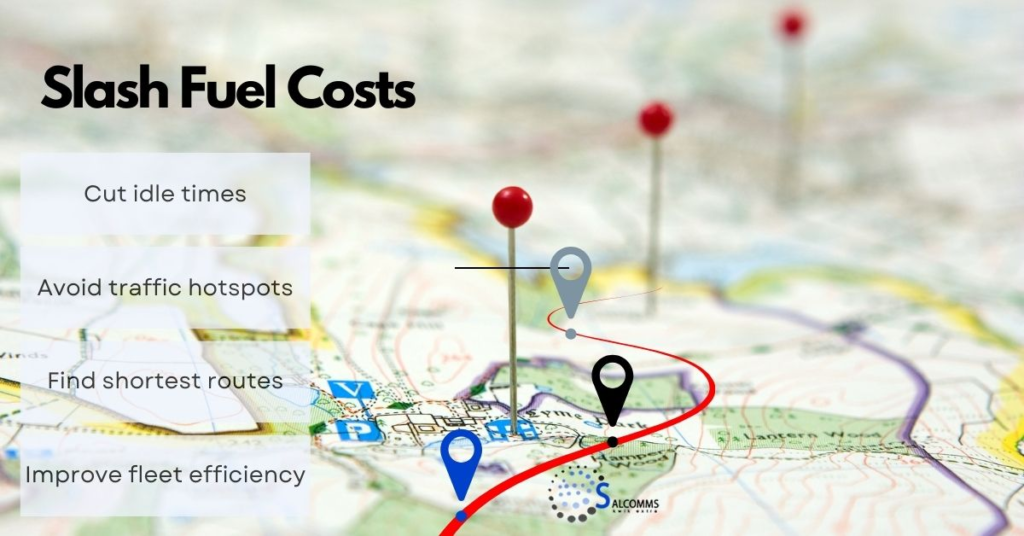Fuel costs can significantly impact your bottom line if they go out of hand.
Fortunately, telematics technology offers you a powerful solution to optimize your fleet’s fuel efficiency, reduce operational expenses, and boost profitability for your business.
In this article, we’ll explore the top five telematics features that every fleet needs to considerably slash fuel costs and streamline operations.
1. Route Optimization: The Key to Fuel Savings
One of the most significant benefits of telematics is its ability to optimize routes for your fleet. By analyzing real-time traffic data, road conditions, and vehicle locations, telematics systems can suggest the most efficient routes, reducing unnecessary mileage and fuel consumption.
The Compelling Case for Route Optimization
Your route may constantly pass through highly dense urban areas where traffic congestion and unpredictable road conditions can quickly turn a simple delivery into a fuel-guzzling nightmare. With route optimization, you can easily:
- Avoid traffic hotspots and construction zones
- Minimize idle time and unnecessary detours
- Plan the most direct and fuel-efficient routes
By implementing route optimization, you are guaranteed to see significant fuel savings, as well as improved on-time delivery rates and customer satisfaction.

2. Idling Monitoring: Cutting Costs and Emissions
Excessive idling not only wastes fuel but also contributes to increased emissions and maintenance costs. Telematics systems can monitor and report idling events, allowing you to identify and address problematic driver behavior.
The Impact of Idling on Your Fleet’s Bottom Line
Consider the following scenario: One of your delivery trucks idles for an average of 30 minutes per day during loading and unloading operations. Over the course of a year, this seemingly insignificant idling time can result in a staggering fuel wastage that takes a huge chunk out of your profits.
By implementing idling monitoring and providing driver training, you can easily eliminate unnecessary idling, leading to substantial fuel cost savings and a reduced carbon footprint for your fleet.
3. Vehicle Maintenance Tracking: Keeping Your Fleet Fuel-Efficient
Regular vehicle maintenance is crucial for ensuring optimal fuel efficiency. Telematics systems can track and remind you of upcoming maintenance schedules, preventing breakdowns and ensuring your vehicles operate at their peak performance.
The Link Between Maintenance and Fuel Efficiency
Neglecting routine maintenance tasks, such as oil changes, tire rotations, and air filter replacements, can significantly impact your vehicles’ fuel efficiency. For instance, an improperly inflated tire can increase fuel consumption by up to 5%, and it could be higher depending on factors like the severity of under-inflation, vehicle type, and driving conditions. [Source: Goodyear Tire and Rubber Company]
| Vehicle Condition | Fuel Efficiency (km/l) | Maintenance Cost (Naira/month) | Insights | Annual cost (N) |
|---|---|---|---|---|
| Well-Maintained | 15 | 50,000 | Higher fuel efficiency and lower maintenance costs due to regular upkeep. | 600,000 |
| Poorly Maintained | 10 | 100,000 | Lower fuel efficiency and higher maintenance costs due to neglected upkeep. | 1,200,000 |
Insights for Fleet Managers
- Fuel Efficiency Impact: Well-maintained vehicles offer a significant improvement in fuel efficiency (50% more kilometers per liter). This translates to fewer refueling stops and lower overall fuel expenses.
- Cost Efficiency: Regular maintenance, while having a fixed monthly cost, reduces the likelihood of unexpected and expensive repairs. Poor maintenance can double the monthly maintenance cost due to breakdowns and inefficiencies.
- Long-Term Savings: Investing in regular maintenance can lead to long-term savings. The increased fuel efficiency and reduced repair costs of well-maintained vehicles offset the initial maintenance expenses.
- Operational Reliability: Well-maintained vehicles are more reliable, reducing downtime and ensuring that the fleet operates smoothly. This reliability is crucial for meeting delivery schedules and maintaining customer satisfaction.
- Resale Value: Vehicles that are well-maintained have a higher resale value. Poorly maintained vehicles depreciate faster, resulting in lower returns when it’s time to upgrade the fleet.
- Safety: Regularly maintained vehicles are safer for drivers and the public, reducing the risk of accidents due to mechanical failures.
Regular maintenance will help you optimize your operational costs, improve efficiency, and ensure the longevity and reliability of your vehicles.
4. Driver Behavior Monitoring: Encouraging Fuel-Efficient Driving Habits
Telematics systems can monitor driver behavior, including harsh braking, rapid acceleration, and excessive speeding, all of which contribute to increased fuel consumption. By identifying and addressing these behaviors, you can encourage your drivers to adopt more fuel-efficient driving practices.
The Significance of Driver Training
Aggressive driving (speeding, rapid acceleration and braking) can lower your gas mileage by roughly 15% to 30% at highway speeds and 10% to 40% in stop-and-go traffic.
By providing targeted driver training and coaching based on telematics data, you can:
- Improve driver safety and reduce the risk of accidents
- Extend the lifespan of your vehicles by reducing wear and tear
- Achieve significant fuel cost savings through improved driving habits

Investing in driver training not only benefits your bottom line but also promotes a culture of safety and sustainability within your fleet operations.
5. Fuel Consumption Tracking: Gaining Insights for Optimization
Telematics systems can provide detailed fuel consumption data, allowing you to identify trends, inefficiencies, and opportunities for improvement. By analyzing this data, you can make informed decisions about vehicle replacements, route planning, and operational strategies to maximize fuel efficiency.
Uncovering Hidden Opportunities for Fuel Savings
Imagine having access to a comprehensive dashboard that provides real-time fuel consumption data for your entire fleet. This information can help you:
- Identify underperforming vehicles and prioritize replacements
- Evaluate the impact of driver training programs on fuel efficiency
- Optimize routes and schedules based on fuel consumption patterns
By leveraging fuel consumption tracking, you can continuously monitor and refine your fleet operations, ensuring that every drop of fuel is utilized efficiently and cost-effectively.
At Salcomms Trackers, we understand the challenges faced by fleet managers and business owners in Nigeria.
Our telematics solutions are designed to provide you with the tools and data you need to slash fuel costs, streamline operations, and drive profitability.
Learn how our telematics features can help optimize your fleet managment